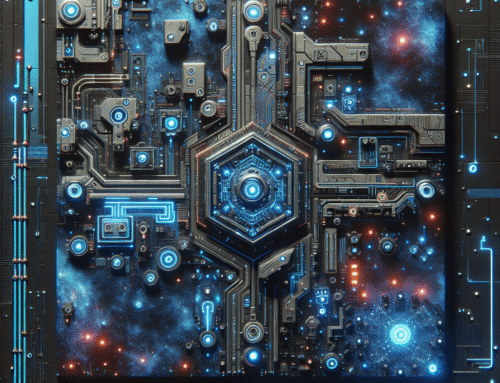Exploring Star Atlas: A Speculative Economy Deep Dive

Exploring Star Atlas: A Speculative Economy Deep Dive
Alright folks, let’s dive into the cosmic dumpster fire that is Star Atlas, the sprawling metaverse where spaceships aren’t just for sci-fi movies but for making digital dollars and questionable life choices. This grandiose online universe promises more than just flashy graphics and pixelated spaceships. It’s a self-proclaimed ‘blockchain-based space exploration game’ that’s got folks as giddy as a kid in a candy store – if that candy store was also a black hole of capital investment!
For the uninitiated, Star Atlas is like if a love child of No Man’s Sky and Star Trek decided to take a couple of hits off the cryptocurrency bong. Developed on Solana, it’s all about navigating the political landscape of three factions while mining for tangible assets (and I’m not just talking about Terra’s latest 3D model). Players can own ships, land, and even avatars in this universe, and guess what? They’re turning a profit. Well, sort of – it’s speculative, remember? If this were a carnival game, you’d definitely want to keep your eye on the ball.
Now let’s get down to the nuts and bolts—or should I say, the hemp and holograms? The in-game economy is rooted in two stand-out currencies: ATLAS and POLIS. ATLAS is your primary currency, much like Monopoly money but with a lot less emotional investment. You use it for buying ships, land, and every other shiny object that catches your virtual eye. Then there’s POLIS, the governance token, which gives you a voice in the political machinations of the Star Atlas universe. Because who wouldn’t want to vote on interstellar tax laws? It’s like saying you care about local elections, except here, your vote could win you a spaceship!
Now, this is where things get spicy. Star Atlas operates under a resource-based economy—a fancy way of saying that you’re mining for things like minerals and spaceships that you can sell for profit. And, my dear space cadets, just like real life, not everything’s a picnic! You may have one guy who spends his weekends mining asteroids while another sucker is out there buying political clout. Meanwhile, that beautiful ship you splurged on might just become another mortgage payment in disguise.
But there’s a catch: all of these adventures and profits are just as ephemeral as the last performance of a bad Vegas magician. You see, the notion of long-term sustainability is like a mirage in this high-octane universe. The economy can swing more wildly than your cousin at a wedding when the DJ plays that one song. And what happens if the trend of speculative investments goes belly-up? You’re left holding a keychain spaceship collecting digital dust and regret!
The developers are keenly aware of these dynamics and are forced to maintain a careful balance between player engagement and economic viability. They’re creating new quests, expanding the universe, and trying to tickle that good old “fear of missing out” bone, all while managing the wave of speculation that surges around each new NFT drop. It’s the ultimate balancing act—like a tightrope walker who’s also juggling flaming swords while riding a unicycle.
So, what’s the future of Star Atlas? Depends on who you ask! Some see it as the dawn of interstellar investment opportunities where people are finally getting that sci-fi life they’ve always wanted. Others view it as the next ponzi scheme waiting to implode. Either way, it’s a vivid reminder of how intertwined digital ownership and speculative economies can be.
If you want to keep your ear to the ground—or rather, to the galaxies—about the intricacies of Star Atlas, check out Titan Analytics. We’re your Solana validator and your one-stop-shop for Star Atlas analytics. Ready to make informed decisions or just want to watch the chaos unfold? Go to https://titananalytics.io/modules/ for our Star Atlas data modules, or if you want to engage in some good ol’ fashioned human interaction, hit us up at https://titananalytics.io/contact/.
In the end, whether you come for the space battles or stay for the economic rollercoaster, just remember: it’s all just pixels on a screen… or is it?




